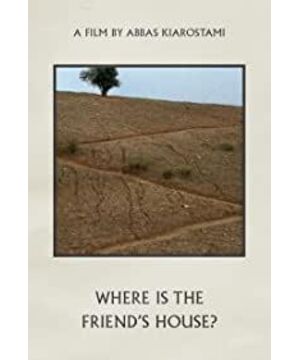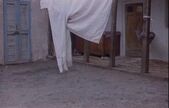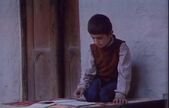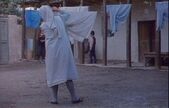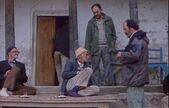We don't have to take a "power metaphor" for granted, we can easily guess the ending of the main story: Amud's hard work twice may not be able to fulfill his wish - return the wrong workbook to classmates, in this Under the theme of "finding", big or small, we may be more concerned about the process of "finding". The names of classmates, the pants worn by classmates, the dead tree in front of the classmates' house, these are the clues he can rely on, but the unique things in the eyes of children are "repeated" in the real world: there are many children with multiple names, the same pants and dead tree. In the face of the cold "don't know" of adults, the words that Amud repeated over and over again belonged to the so-called "children's ignorance and naivety", but what else could he rely on? In fact, he always relied on his own simple stubbornness: he must find his classmates and return the workbook. The adults wouldn't have the patience to understand why he ran out without finishing his homework or buying bread, they would just take it for granted that he wanted to run out and play, that he needed to be taught to be obedient, to know the rules, to be disciplined. It is also the idea that teachers instill in them all the time in school. When a film's story is very simple and its themes seem remarkably clear, the careless little details it embraces can get extra attention. For example: the empty shot at the beginning of the film is aimed at the closed door of the classroom, and the sound of laughter can be vaguely heard inside. One hand opens the door, and the atmosphere of the classroom changes immediately. Is this door open or closed? For example, Amud used the trousers of his classmates as a clue to search and verify. A cat's meow was always interspersed during the period, but the cat never showed up. Aren't the meowing of cats and pants a sign that the "deity" is not present? For example: After Amud failed to find his classmates, the wind never stopped. He was crawling on the ground to do his homework, and the wind blew open the door of his house. Isn't the wind in his heart not stopped for a moment? Literary and artistic works often have "intertextuality" that spans eras and regions, consciously borrowing or challenging their predecessors, that is, "influenced anxiety", and the similarity of unconscious overlap or reproduction just shows the connection of the origin of art, and this film has at least three things that make me Fantastic. The first place: Is the mountain road that Amud walks up and down the mountain slope like the letter M lying on the right (the familiar expression in Chinese is "zigzag"), whether it is consistent with the early writing format of ancient Greek poetry (the first line from Left to right, the next line is from right to left, and so on and so forth, like the route taken by the "plough" when ploughing the land) If someone wants to look for the "repetitive" and "circumferential" "poetry" from the film, there is no more suitable sustenance than this scene that appears three times in the film. The second place: The lonely old carpenter led Amud to his classmate's house, the faint light sprinkled on the dark path, Also took care of the faces of the old carpenter and Amer. Seeing this, Latour's "Candlelight Painting" and "Saint John the Carpenter" suddenly appeared in front of my eyes, so the very everyday scene in the film seemed to have some kind of "sacred" light, the persistent Ahmud and the chanting Isn't the old carpenter with his superb craftsmanship the light in the unremarkable world of films? The third place, the little flower in the workbook in the last shot, is what the old carpenter asked Ahmed to put in. He did not find his classmates, so he helped them with their homework, and the classmates were exempted from punishment, and the teacher did not find the "ghostwriting". I don't know why I think of the proud rose in "The Little Prince". Of course, the two have different meanings, and the diametrically opposed world of adults and children constructed in "The Little Prince" is not consistent in this film. Because when Ahmed came home at night, his parents did not punish him, his father did not speak or beat him, and his mother repeatedly urged him to eat. As a result, the simple opposition and separation that were constantly highlighted in the filming process, although not disappeared, seemed to have been blown away by the strong wind that night. The director is not simple, and he does not repeat the simplicity of "The Little Prince", but in fact, Amud's clear eyes are enough to kill any pretentiousness. Abbas is well-known. Although it cannot be said that his name is well-deserved at first glance, he is at least not disappointed. I will continue to watch it in the future.
View more about Where Is the Friend's House? reviews


